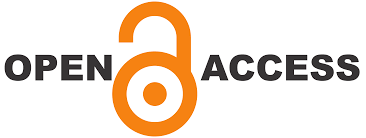Narrative Review of Digital Literacy Curriculum Implementation in Early Childhood Education
Keywords:
Digital Literacy, Early Childhood Education, Socio-Cultural Context, Curriculum Framework, Policy AlignmentAbstract
This study examines the integration of digital literacy into early childhood education (ECE) through a socio-cultural and policy-aligned lens. Employing a qualitative document analysis and framework synthesis, policy documents from Indonesia and international organizations were reviewed alongside research on child development and pedagogical innovation. Findings reveal that effective digital literacy implementation requires culturally responsive strategies, equitable access, and alignment with national and international policies. The proposed framework emphasizes staged integration, play-based learning, teacher competency, family engagement, and community partnerships. Practical implications highlight that digital literacy is a transformative component bridging theory and practice, fostering holistic child development and preparing children for the digital age. Challenges include infrastructure disparities, limited assessment tools, and privacy concerns, necessitating targeted policy interventions and professional development. This study provides actionable guidance for curriculum designers and policymakers to ensure inclusive and effective digital literacy adoption in ECE.
Downloads
References
Afrilyasanti, R., & Basthomi, Y. (2023). Supporting Students’ Critical Media Literacy Skills Using Digital Storytelling through the Flipgrid Application. CALL-EJ, 24(1).
Aldosemani, T. I. (2023). Leveraging Open Educational Resources to Promote Openness and Internationalization in Education: A Case Study of SHMS According to UNESCO Recommendations. Journal of Higher Education Policy and Leadership Studies, 4(4). https://doi.org/10.61186/johepal.4.4.88
Amin, A. Muh., Adiansyah, R., & Hujjatusnaini, N. (2023). The Contribution of Communication and Digital Literacy Skills to Critical Thinking. Jurnal Pendidikan Sains Indonesia, 11(3). https://doi.org/10.24815/jpsi.v11i3.30838
Anghelo Josué, Bedoya-Flores, M. C., Mosquera-Quiñonez, E. F., Mesías-Simisterra, Á. E., & Bautista-Sánchez, J. V. (2023). Educational Platforms: Digital Tools for the teaching-learning process in Education. Ibero-American Journal of Education & Society Research, 3(1). https://doi.org/10.56183/iberoeds.v3i1.626
Asmayawati, A. (2023a). Can Technology Initiate The Enhancement of Digital Literacy in Early Childhood? Evidence From Indonesia. International Journal of Current Science Research and Review, 06(11). https://doi.org/10.47191/ijcsrr/v6-i11-25
Asmayawati, A. (2023b). Diversity of Learning Opportunities and Learning Innovation in Mattering Digital Literacy: The Role of Digital Storytelling. International Journal of Current Science Research and Review, 06(11). https://doi.org/10.47191/ijcsrr/v6-i11-27
Azhari, S. C., Rosali, E. S., Firmansyah, M. F., & Maulana, H. Z. (2022). Investigating Family and Peer Support on Learning Habits and Achievements in Online Learning. JINOTEP (Jurnal Inovasi Dan Teknologi Pembelajaran): Kajian Dan Riset Dalam Teknologi Pembelajaran, 9(2). https://doi.org/10.17977/um031v9i22022p136
Bariyyah, K. (2021). Problem solving skills: esssential skills challenges for the 21st century graduates. Jurnal EDUCATIO: Jurnal Pendidikan Indonesia, 7(1). https://doi.org/10.29210/120212843
Barman, L., & Kjällander, S. (2022). Playful and Meaningful Learning of Programming. What does it Take to Integrate an App-Based Game Promoting Digital Mathematics into Early Childhood Education? Designs for Learning, 14(1). https://doi.org/10.16993/dfl.203
Beane, J. A. (2020). Integrative Curriculum. In Oxford Research Encyclopedia of Education. https://doi.org/10.1093/acrefore/9780190264093.013.1082
Chan, C. (2020). The New Roles Of Teachers In 21st Century Learning. International Journal of Creative Multimedia, 1(1). https://doi.org/10.33093/ijcm.2020.1.x1.12
Chang, C. C., & Yang, S. T. (2023). Interactive effects of scaffolding digital game-based learning and cognitive style on adult learners’ emotion, cognitive load and learning performance. International Journal of Educational Technology in Higher Education, 20(1). https://doi.org/10.1186/s41239-023-00385-7
Dewi, V. I., Febrian, E., Effendi, N., Anwar, M., & Nidar, S. R. (2020). Financial literacy and its variables: The evidence from indonesia. Economics and Sociology, 13(3). https://doi.org/10.14254/2071-789X.2020/13-3/9
Dimas, T. S., & Laili, E. R. (2025). Implementation Strategy of Multimodal Literacy Text as a Means to Optimize Literacy in Indonesian Language Lessons for Elementary School Students. BAHASTRA, 45(1), 156–165. https://doi.org/10.26555/bahastra.v45i1.1260
Edgel, T., McCarstle, S., Reyes, N., & Leibold, A. (2021). A Professional Development Workshop Using Digital Literacy to Build Students’ Self‐Efficacy and Sense of Belonging on Campus. Journal of College Academic Support Programs, 3(2). https://doi.org/10.36896/3.2pp2
Erny Arniza, A. (2024). Revolutionizing learning: leveraging social media platforms for empowering open educational resources. International Journal on E-Learning and Higher Education, 19(1). https://doi.org/10.24191/ijelhe.v19n1.1915
Evridawati, B., Yufiarti, & Yetti, E. (2020). The Cognitive Style and Attachment on Early Childhood Speech Skills. JPUD - Jurnal Pendidikan Usia Dini, 14(1). https://doi.org/10.21009/jpud.141.03
Fatqurhohman, F. (2025). Transformasi Kepemimpinan Pendidikan Era VUCA: Strategi Menuju Institusi Unggul dan Adaptif. CV. Ihsan Cahaya Pustaka. ihsancahayapustaka.id
Fatqurhohman, F., & Huda, H. (2025). Implementation of Articulate Storyline Learning Media in Cultivating Students’ Character in The Digital Era. AULADUNA: Jurnal Pendidikan Dasar Islam, 12(1), 11–22. https://doi.org/10.24252/auladuna.v12i1a2.2025
Fitriyah, Q. F., Qaidatiningsih, S. P., & Nafisah, S. O. (2023). Immigrant Digital Generation Teacher Efforts in Investing Digital Literacy in Early Childhood Education. Early Childhood Research Journal (ECRJ), 6(1). https://doi.org/10.23917/ecrj.v6i1.23021
Foster, N., & Piacentini, M. (2023). OECD Innovating Assessments to Measure and Support Complex Skills. OECDPublishing. https://doi.org/10.1787/e5f3e341-en
Hoffman, E. B., & Mangino, A. A. (2023). The digital literacies of early childhood educators: perceptions of collaborative online learning. Journal of Early Childhood Teacher Education, 44(3). https://doi.org/10.1080/10901027.2022.2075812
Huang, X., Ma, T., Jia, L., Zhang, Y., Rong, H., & Alnabhan, N. (2023). An effective multimodal representation and fusion method for multimodal intent recognition. Neurocomputing, 548. https://doi.org/10.1016/j.neucom.2023.126373
Hubers, M. D., D.Endedijk, M., & Van Veen, K. (2022). Effective characteristics of professional development programs for science and technology education. Professional Development in Education, 48(5). https://doi.org/10.1080/19415257.2020.1752289
Insani, A., Yufiarti, & Yetti, E. (2021). Parental Involvement and Mothers’ Employment on Children’s Independence During Covid-19 Pandemics. JPUD - Jurnal Pendidikan Usia Dini, 15(1). https://doi.org/10.21009/jpud.151.02
Intiana, S. R. H., Prihartini, A. A., Handayani, F., Mar’i, M., & Faridi, K. (2023). Independent curriculum and the indonesian language education throughout the era of society 5.0: a literature review. AL-ISHLAH: Jurnal Pendidikan, 15(1). https://doi.org/10.35445/alishlah.v15i1.3140
Janattaka, N., & Adella, P. C. C. (2021). Peran Platform Digital dalam Pembelajaran Daring. Almufi Jurnal Pendidikan, 1(3).
Kafoussi, S., Chaviaris, P., & Moutsios-Rentzos, A. (2019). Investigating Parental Influences on Sixth Graders’ Mathematical Identity in Greece: A Case Study. International Electronic Journal of Mathematics Education, 15(2). https://doi.org/10.29333/iejme/6279
Kalogiannakis, M., Papadakis, S., & Zourmpakis, A. I. (2021). Gamification in science education. A systematic review of the literature. Education Sciences, 11(1). https://doi.org/10.3390/educsci11010022
Kemendikbud. (2023). Kemendikbudristek wujudkan pendidikan inklusi yang adil dan merata. Kementerian Pendidikan, Kebudayaan, Riset, Dan Teknologi (Kemendikbudristek).
Khotimah, N., Riyanto, Y., & Bachri, B. S. (2022). Implementation of Blended Learning to Improve Motivation and Learning Outcomes of Pre-Service Early Childhood Teachers. Journal of Educational and Social Research, 12(5). https://doi.org/10.36941/jesr-2022-0139
Kim, J.-E. (2024). Diagnosis of Digital Literacy Competence for Preservice Early Childhood Educators. Korean Association For Learner-Centered Curriculum And Instruction, 24(2). https://doi.org/10.22251/jlcci.2024.24.2.327
Lauricella, A. R., Herdzina, J., & Robb, M. (2020). Early childhood educators’ teaching of digital citizenship competencies. Computers and Education, 158. https://doi.org/10.1016/j.compedu.2020.103989
Li, X., Zhao, P., Wu, M., Chen, Z., & Zhang, L. (2021). Deep learning for human activity recognition. In Neurocomputing (Vol. 444). https://doi.org/10.1016/j.neucom.2020.11.020
Lim, F. V., & Tan-Chia, L. (2022). Multimodal Literacy Learning with Digital Texts. In Designing Learning for Multimodal Literacy. https://doi.org/10.4324/9781003258513-4
Maharani, S. (2023). Trends in Mathematics Research in Early Childhood: Bibliometric Review. Jurnal Obsesi: Jurnal Pendidikan Anak Usia Dini, 7(4). https://doi.org/10.31004/obsesi.v7i4.4907
Marmoah, S., Poerwanti, S., & Jenny, S. I. (2022). Literacy culture management of elementary school in Indonesia. Heliyon, 8(4). https://doi.org/10.1016/j.heliyon.2022.e09315
Maureen, I. Y., van der Meij, H., & de Jong, T. (2020). Enhancing Storytelling Activities to Support Early (Digital) Literacy Development in Early Childhood Education. International Journal of Early Childhood, 52(1). https://doi.org/10.1007/s13158-020-00263-7
Meirbekov, A., Maslova, I., & Gallyamova, Z. (2022). Digital education tools for critical thinking development. Thinking Skills and Creativity, 44. https://doi.org/10.1016/j.tsc.2022.101023
Nisa, H., Isnaini, M., Utami, L. S., & Islahudin, I. (2023). Collaborative Learning Effect on Improving Students’ Creativity and Critical Thinking in the Independent Curriculum. AL-ISHLAH: Jurnal Pendidikan, 15(3). https://doi.org/10.35445/alishlah.v15i3.3538
Pang, T. Y., Lee, T. K., & Murshed, M. (2023). Towards a New Paradigm for Digital Health Training and Education in Australia: Exploring the Implication of the Fifth Industrial Revolution. Applied Sciences (Switzerland), 13(11). https://doi.org/10.3390/app13116854
Papadakis, S., Zaranis, N., & Kalogiannakis, M. (2019). Parental involvement and attitudes towards young Greek children’s mobile usage. International Journal of Child-Computer Interaction, 22. https://doi.org/10.1016/j.ijcci.2019.100144
Papanastasiou, G., Drigas, A., Skianis, C., Lytras, M., & Papanastasiou, E. (2019). Virtual and augmented reality effects on K-12, higher and tertiary education students’ twenty-first century skills. Virtual Reality, 23(4). https://doi.org/10.1007/s10055-018-0363-2
Park, H., Kim, H. S., & Park, H. W. (2021). A Scientometric Study of Digital Literacy, ICT Literacy, Information Literacy, and Media Literacy. Journal of Data and Information Science, 6(2). https://doi.org/10.2478/jdis-2021-0001
Poulton, P., & Mockler, N. (2024). Early career primary teachers’ curriculum-making experiences: Enablers and constraints to knowledge-led forms of curriculum-making. Curriculum Journal, 35(1). https://doi.org/10.1002/curj.225
Preez, H. Du, & West, J. (2022). Early childhood studentteachers experiences of blended learning using Community of Inquiry as theoretical framework. Perspectives in Education, 40(4). https://doi.org/10.38140/pie.v40i4.6186
Putriana, M., Matin, M., Sugiarto, S., & Darmawan, T. (2021). National Character Education Policy in Law Number 23 0f 2019. AL-ISHLAH: Jurnal Pendidikan, 13(2). https://doi.org/10.35445/alishlah.v13i2.636
Reddy, P., Chaudhary, K., & Hussein, S. (2023). A digital literacy model to narrow the digital literacy skills gap. Heliyon, 9(4). https://doi.org/10.1016/j.heliyon.2023.e14878
Redondo-Rodríguez, C., Becerra-Mejías, J. A., Gil-Fernández, G., & Rodríguez-Velasco, F. J. (2023). Influence of Gamification and Cooperative Work in Peer, Mixed and Interdisciplinary Teams on Emotional Intelligence, Learning Strategies and Life Goals That Motivate University Students to Study. International Journal of Environmental Research and Public Health, 20(1). https://doi.org/10.3390/ijerph20010547
Saleha, L., Baharun, H., & Trimelia Utami, W. (2022). Implementation of Digital Literacy to Develop Social Emotional in Early Childhood. Indonesian Journal of Early Childhood Educational Research (IJECER), 1(1). https://doi.org/10.31958/ijecer.v1i1.5834
Setiadi, R., & Frederika, R. (2022). Family financial planning for disaster preparedness: A case study of North Semarang, Indonesia. International Journal of Disaster Risk Reduction, 82. https://doi.org/10.1016/j.ijdrr.2022.103332
Shamsuddin, N., & Kaur, J. (2020). Students’ learning style and its effect on blended learning, does it matter? International Journal of Evaluation and Research in Education, 9(1). https://doi.org/10.11591/ijere.v9i1.20422
Sihabudin. (2021). Blended Learning Strategi Pembelajaran di Era Digital. In Nucl. Phys.
Su, J., & Zhong, Y. (2022). Artificial Intelligence (AI) in early childhood education: Curriculum design and future directions. Computers and Education: Artificial Intelligence, 3. https://doi.org/10.1016/j.caeai.2022.100072
Sudarti, Abdulhak, I., Rusman, & Riyana, C. (2020). Digital literacy for early childhood education teachers in society 5.0. ACM International Conference Proceeding Series. https://doi.org/10.1145/3452144.3452258
Supriyadi, & Juwita, A. D. (2023). The Effect of Parenting Patterns and Digital Literacy on The Development of Early Children’s Creativity. AKSARA: Jurnal Ilmu Pendidikan Nonformal, 9(02).
Supriyadi, S. (2022). Hybrid Learning on Digital Literacy in The Implementation of Curriculum Merdeka. Jurnal Inovasi Pendidikan MH Thamrin, 6(2). https://doi.org/10.37012/jipmht.v6i2.771
Tatminingsih, S. (2022). Implementation of Digital Literacy in Indonesia Early Childhood Education. International Journal of Emerging Issues in Early Childhood Education, 4(1). https://doi.org/10.31098/ijeiece.v4i1.894
Trimuliana, Ifina. M. P. (2021). Penerapan Metode Demonstrasi Untuk Anak Usia Dini. In Ruang Guru PAUD Kemdikbud.go.id.
Ulum, M. (2020). Kebijakan Standar Nasional Pendidikan. Syaikhuna: Jurnal Pendidikan Dan Pranata Islam, 11(1). https://doi.org/10.36835/syaikhuna.v11i1.3845
Ulya, A., Waluyo, E., & Mulyani, P. K. (2023). Implementation of Strengthening Governance of Cultural and Citizenship Literacy in Gunungpati State Kindergarten, Semarang City. International Journal of Research and Review, 10(10). https://doi.org/10.52403/ijrr.20231037
Windram, J. D., Neal, A., & McMahon, C. J. (2023). Evolution in Congenital Cardiology Education: The Rise of Digital-Learning Tools. CJC Pediatric and Congenital Heart Disease, 2(2). https://doi.org/10.1016/j.cjcpc.2022.12.005
Woulfin, S. L., & Jones, B. (2024). Re-setting special education for justice: An essay on the logics and infrastructure enabling deep change in the COVID-19-era. Journal of Educational Change, 25(4). https://doi.org/10.1007/s10833-023-09483-9
Yulianti, K., Denessen, E., Droop, M., & Veerman, G. J. (2022). School efforts to promote parental involvement: the contributions of school leaders and teachers. Educational Studies, 48(1). https://doi.org/10.1080/03055698.2020.1740978
Yuniawan, T., Rokhman, F., Retnoningsih, A., Prasetiyo, B., & Maretta, Y. A. (2022). Students’ Eco-Literacy Level at Conservation-Minded University in Indonesia. Academic Journal of Interdisciplinary Studies, 11(6). https://doi.org/10.36941/ajis-2022-0169
Yusuf, A. M., Hidayatullah, S., & Tauhidah, D. (2022). The relationship between digital and scientific literacy with biology cognitive learning outcomes of high school students. Assimilation: Indonesian Journal of Biology Education, 5(1). https://doi.org/10.17509/aijbe.v5i1.43322
Downloads
Published
Data Availability Statement
All data generated or analyzed during this study are included in this published article. Additional datasets are available from the corresponding author upon reasonable request.
Issue
Section
License
Copyright (c) 2025 Betty Fitriani, Dian Yahya, Indrawati Setyaningrum (Author)

This work is licensed under a Creative Commons Attribution-ShareAlike 4.0 International License.













